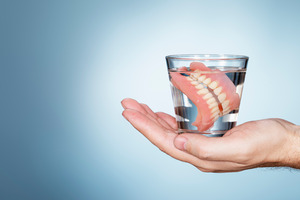
Dentures can do a lot of things for patients who are missing teeth, allowing them to project a level of confidence that it can be difficult to find elsewhere. If you’ve found it difficult to talk or be your best self since you’ve lost your teeth, this prosthetic could be perfect for you.
While your prosthetic can allow you to incorporate a wider range of foods into your diet than you could without teeth, there are certain things that dentures won’t allow you to eat. Here’s what you should know about how prosthetics affect overall nutrition, and what you can do to eat a well-rounded diet.
Will Dentures Affect My Nutrition?
As you might imagine, dentures being unable to eat certain things might make it difficult to eat a well-rounded diet. You may be interested to know that there have been some studies done on this subject.
Recent research from the Regenstrief Institute and Indiana University School of Dentistry looked at blood work for dental patients, both those with and without dentures. When comparing the results over the course of four years, they found that patients who had dentures saw declines in key nutritional markers, much greater than those who did not have a prosthetic.
What to Do If You Have Dentures
If you have dentures or are getting them soon, it is therefore a good idea to think a little bit about how that could affect your overall nutrition. First of all, you might want to go out of your way to make sure that the foods that you’re eating are healthy, in addition to them being easy to process with your dentures.
Soft, nutritious foods are perfect in this regard—eggs, yoghurt, and smoothies being great examples. You might also want to talk to your doctor about supplements that can give you vitamins and minerals you’re missing out on, as well as taking regular bloodwork to ensure that you’re in good health.
And if you find that your dentures are unable to eat everything that they should, like if tender meats or fish are difficult to chew, it could be that you’re due for a reline. Talk to your dentist so that your diet is everything that it should be.
About Our Practice
At Salmon Brook Dental, we know that every patient is different, and that there’s no way to treat them effectively without getting to know them as individuals. For that reason, we make it a point to form personal relationships with all of our patients, coming to understand not only what treatment they need, but how the care they receive will affect their life as a whole.
If you have any questions about dentures, we can be reached at our website or by phone at (860) 653-4551.
